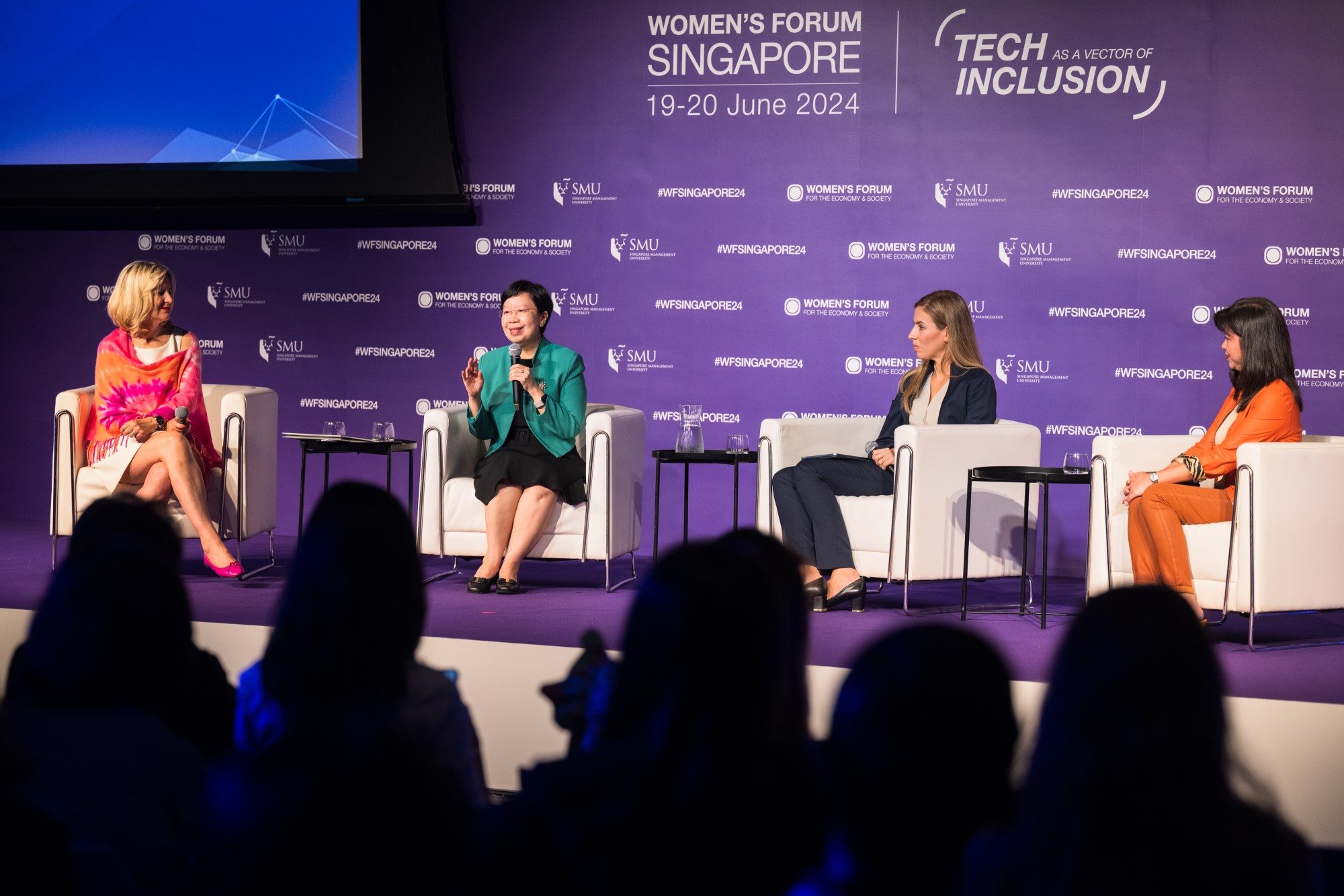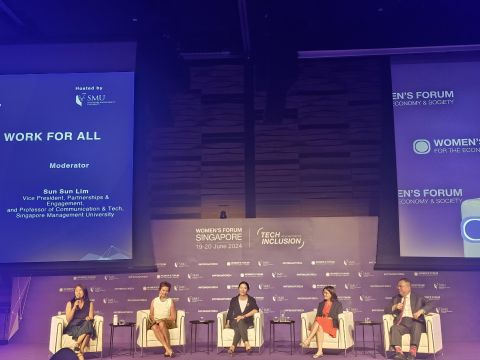Championing education and inclusion for a fairer future

SMU took a prominent role in the Women’s Forum Singapore 2024, the leading international platform for advancing women’s leadership and fostering positive societal change. Organised in partnership with SMU, the Forum gathered diverse voices on 19 and 20 June 2024 to explore critical issues and drive meaningful impact.
This year’s event, latest in the long-running series of international forums under the Women’s Forum for the Economy and Society umbrella, championed education as a driver of inclusion, and convened over 500 leaders and experts from public and private sectors. SMU President Professor Lily Kong and Vice President (Partnerships and Engagement) Professor Sun Sun Lim actively contributed their insights and expertise to crucial discussions on education and the future of work.
Democratising learning: The keynote insights
In her opening remarks, Prof Kong highlighted the importance of democratising learning for all by providing equitable access to technology and broadband access, complemented by initiatives to enhance digital literacy – perspectives which aligned with the theme of “tech as a vector of inclusion”.
Prof Kong further emphasised the need to update existing “software” that hinders inclusivity by perpetuating cultural biases or rigid societal structures.
“In education, achieving greater gender inclusivity necessitates a fundamental re-design of the curriculum. Traditional models, once centred on knowledge acquisition, must be upgraded into frameworks that place premium on critical thinking, problem-solving, and adaptability,” she said. This also includes the importance of transforming educational paradigms.
The transformative power of EdTech
Prof Kong also spoke as part of the panel discussion titled “Harnessing the Potential of Technology to Educate for Change”.
The other panellists included Inge Kerkloh-Devif, senior executive director of the HEC Paris Innovation & Entrepreneurship Institute and co-site lead executive of the Creative Destruction Lab Paris, HEC Paris; and Yueh Mei Liu, co-founder and CEO of HeyHi Pte Ltd.
Their discussion explored the transformative power of Education Technology (EdTech) in making education more inclusive, efficient, and collaborative, particularly through its ability to democratise access to learning. Opening access holds immense potential for empowering individuals and fostering a more equitable society overall.
Prof Kong shared her views on how technology impacts approaches to education of both young people and adults.
She emphasised the need for educators to go beyond simply teaching digital skills and technological applications, to cultivating students’ ability to scrutinise and direct technology’s broader social impact.
An interdisciplinary approach is needed to achieve this, said Professor Kong, integrating perspectives from politics, economics, and social sciences – a process that is central to SMU’s educational philosophy.
She also highlighted SMU’s intentionality in using technology to create more personalised, interactive and experiential experiences for students. Using this example, she re-emphasised to the audience that technology should not be used as an end in itself. Instead, it should be harnessed as a tool to create value for society and humanity at large.
This emphasis on technology's role in education reflects SMU's ongoing commitment to creating a more just and inclusive educational landscape through relevant initiatives.
Unlocking the future: Inclusivity in the workplace
Prof Lim also played a key role in the forum, moderating a panel titled “Navigating a Fairer Future of Work for All”.
On the panel were Feon Ang, managing director, APAC, LinkedIn; Helen Duce, CEO, Include Consulting PTE; Ian Lee, group executive committee member of The Adecco Group, global president, Geographies, The Adecco Group and president, Adecco Workforce Solution, Asia Pacific and Japan; and Ulrike Wieduwilt, managing director, Russell Reynolds Associates Singapore Pte Ltd.

The panel explored the critical role of diversity in fostering innovation and driving economic growth.
Prof Lim shared: “Technology can help to make workplaces more inclusive by democratising access to skills. But the organisation must celebrate and valorise diversity, equitability, and inclusion before introducing technological tools and solutions.”
The panel highlighted the ways in which diversity of thought and experience can breed creativity, leading to solutions that better address the needs of a complex and evolving workforce. They also covered the wealth of potential that companies can unlock by promoting gender equality and inclusivity within organisations, paving the way for a more prosperous future for all.

